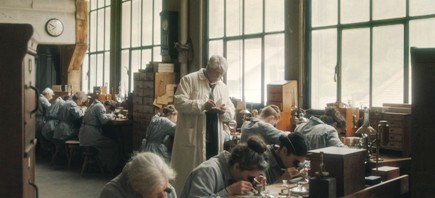 In 1877, the owners of a Swiss clock and watch factory constantly time their employees’ performance, while the workers organize one of the first anarchist communes.
In 1877, the owners of a Swiss clock and watch factory constantly time their employees’ performance, while the workers organize one of the first anarchist communes.
Swiss filmmaker Cyril Schäublin has chosen one quiet moment in history to portray the early stages of the struggle between the industrial owner class and its employees, a moment in which the development of a new idea, anarchism, came into its own. The film, based on real events, is called Unrest. Its style combines an overall feeling of order and tranquility with a tense undercurrent of resistance.
In 1877, the Russian socialist Peter Kropotkin, in exile in Switzerland, visits a town that is the center of the clock and watch making industry in the Canton of Bern. His mission, he says, is to make a map of Switzerland with the place names given by the common people rather than official landmarks. When he visits the watch factory, he is fascinated by what he finds.
The factory workers are mostly women, and this is before the assembly line approach, so each employee is in charge of making the whole watch. The bosses walk about the floor in white coats, timing all the workers to see how fast each of them can do the job, and then we hear their talk to one other about how to get the maximum production out of the labor. They’re timing everything to the last second. They even tell the employees that they have to take only a certain path to come to work, or to lunch, because that path takes the least time to walk. The film is constantly poking fun at the Swiss mania for time; there are even arguments about how to set the clocks accurately.
Genial uniformed police are a regular presence in the town. In this movie, no one raises their voice or fights. The town’s decorum seems to require that all differences must be resolved calmly. Compared to the life we know as moderns, this is remarkable simplicity. But the push to time everything is of course also a push to control, and thus it foreshadows the twentieth century and our own, when regimentation has reached unprecedented heights.
However, right under management’s nose, most of the workers in the watch factory have organized into an anarchist commune, resisting the bosses through questions and small actions, contributing funds to the community, and even donating to anarchists abroad. They discuss their strategies with seemingly perfect confidence. Anarchism, Kropotkin realizes, is really just decentralized socialism.
Schäublin and his team have fashioned a vivid, amazingly realistic version of life in a 19th century town. With an attunement to the sights and sounds of surrounding nature, the director likes to use long shots, where we see human beings in the corner of the frame, whereas solid things like trees and buildings take up the center.
If there is a main character here, it’s one of the workers, Josephine, played by Clara Gostynski. She looks with bemusement on the behavior of the factory managers, sharing sly comments with her friends working at her table. It’s no surprise when we find that she is one of the anarchists. The gentle, bookish Kropotkin makes friends with her, and she adds a nice flourish to the movie when he asks her to tell him what she does. Her long, amusing description of how to assemble a watch centers on the “Unrueh,” or in English, the “Unrest,” which is the balance wheel within the watch that makes it tick, and also gives the film its title.
Schäublin has created a microcosm, an origin story, around the issues of inequality, exploitation, and male dominance, in their simplest expression, but corresponding with astounding force to our current problems. Unrest is a real beauty, a superb cinematic achievement.

Todd Haynes tells the story of this influential New York rock band in the cinematic style of the man who discovered them: Andy Warhol....

Alonso Ruizpalacios’ second film dramatizes the infamous 1985 robbery of ancient Mayan artifacts from Mexico City’s National Museum of Anthropology, in a fascinating character...

Tells the story of astronaut Neil Armstrong by emphasizing the grief at losing his little daughter, and his subsequent shutting down of emotions and...